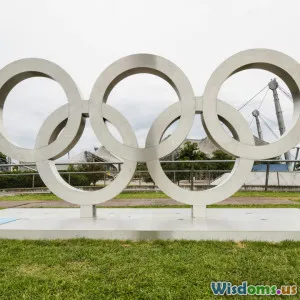
Top Five Doping Scandals That Shook Olympic History
9 min read Explore the top five doping scandals that reshaped the Olympic Games and the ongoing battle for fair competition. (0 Reviews)
Top Five Doping Scandals That Shook Olympic History
Introduction
The Olympic Games stand as the pinnacle of athletic excellence, embodying fair play, determination, and honor. Yet, throughout its prestigious history, the Olympics have been periodically tarnished by scandals that question the integrity of competition. Among the most egregious offenders are doping scandals — cases where athletes or teams use banned substances or methods to artificially improve performance. These high-profile doping controversies not only robbed deserving athletes of their victories but also shook the foundations of international sportsmanship. This article delves into the top five doping scandals that have left an indelible mark on Olympic history, revealing the complexities behind these cases and the ripple effects on sport and society.
1. Ben Johnson’s 1988 Seoul Olympics Sprint Scandal
The drama of the 1988 Summer Olympics is unforgettable, marked most famously by Canadian sprinter Ben Johnson’s shocking disqualification in the 100 meters final. Johnson stunned the world by crossing the finish line in a world record time of 9.79 seconds. However, just days later, he tested positive for stanozolol — a potent anabolic steroid.
This scandal represented one of the first global wake-up calls about doping’s prevalence in elite athletics. Johnson’s gold medal was stripped, and American Carl Lewis was awarded first place. Beyond the immediate consequences, Johnson openly admitted to steroid use in his career, sparking widespread investigations.
Impact and Insights:
- Johnson’s case increased the match pace for more rigorous drug testing worldwide.
- The scandal led the International Olympic Committee (IOC) to implement stricter and more frequent doping controls.
- It revealed that doping wasn’t limited to “fringe” athletes but had crept into top-tier competitions.
Famous quote: Johnson once admitted, "Everyone was doing it. It was the era."
2. The East German Doping Machine (1970s–1980s)
Behind the Iron Curtain, East Germany developed a state-sponsored doping program that propelled its athletes repeatedly to Olympic glory, especially in swimming, athletics, and women’s sports. Their formidable performance masks a sinister secret: systematically administered anabolic steroids and other performance-enhancing drugs often without athletes' informed consent.
Key Facts:
- Around 10,000 athletes subjected to doping protocols.
- Many athletes suffered lifelong health issues due to steroid exposure.
- The program peaked in the 1976 Montreal Games and the 1980 Moscow Olympics, where East Germany ranked among the top medalists.
This covert doping strategy was so systematic that after the fall of the Berlin Wall, many participants testified and legal actions were pursued. The revelations led to increased global attention on protecting athletes’ rights and prompted refinements in detection techniques.
3. The Russian State-Sponsored Doping Scandal (2014 Sochi and Beyond)
Perhaps the most impactful doping scandal in recent Olympic history is the revelation of the Russian state-sponsored doping program that unfolded around the 2014 Sochi Winter Olympics and subsequent games.
An investigation led by Canadian lawyer Richard McLaren uncovered evidence of a sophisticated system where positive samples were swapped or destroyed, facilitated by the Russian Ministry of Sport and security agencies. This scandal implicated multiple athletes across disciplines, breeding distrust across the Olympic community.
Key Points:
- Russia was banned from the 2018 PyeongChang Winter Olympics, though some athletes competed as neutrals.
- The IOC and World Anti-Doping Agency (WADA) implemented rigorous testing and sanctions as a result.
- The scandal sparked global debates on governance, fairness, and the politicization of sport.
Famous quote from IOC President Thomas Bach: "This is a serious case... and the IOC will take a clear position."
4. Marion Jones and the Shadow over the 2000 Sydney Games
Gold medalist sprinter Marion Jones had a shining moment at the 2000 Sydney Olympics, capturing five medals. Yet, this glory was hollowed out nearly a decade later, when she confessed to using performance-enhancing drugs during her peak competitive years.
Jones was subsequently stripped of her medals, including three golds, and served a prison sentence related to the scandal.
Lessons Learned:
- Demonstrated that doping could undermine the legacy of even the most celebrated athletes.
- The confession emphasized the value of retrospective testing and investigations.
- Highlighted the role of credible whistleblowers in uncovering doping offenses.
This case galvanized support for initiatives addressing athlete education and ethical conduct to protect clean competitors.
5. The 2012 London Olympics EPO Blood Doping Scandal
In what remained relatively underreported compared to other scandals, the 2012 London Olympics witnessed significant blood doping offenses involving erythropoietin (EPO), a hormone that boosts red blood cell production to enhance endurance.
One notorious example was the disqualification of Russian wrestler Besik Kudukhov (posthumously cleared but investigations spotlighted systematic doping efforts among Russian athletes). Additionally, some cycling and rowing competitors faced scrutiny.
Context and Consequences:
- This scandal pushed anti-doping agencies to prioritize improving detection of biological doping methods like EPO.
- It showcased the evolution of doping from steroids toward more sophisticated biotechnology cheats.
An important takeaway is how technological advancements led to more complex anti-doping challenges, prompting constant innovation in detection techniques.
Conclusion
The history of Olympic doping scandals unveils a landscape where the quest for athletic glory sometimes leads athletes and nations down ethically questionable paths. From the blatant steroid use of Ben Johnson to the extensive, state-sponsored doping regimes of East Germany and Russia, these cases illuminate the persistent challenges facing the world of sports.
The fallout from these scandals has gone beyond just disqualifications and stripped medals—it has provoked profound discussions about fairness, athlete welfare, and the responsibilities of international sports bodies. Thanks to ongoing advancements in testing and stronger governance, the tide against doping has seen improvement, but vigilance remains critical.
As fans and future athletes, understanding these lessons reinforces the importance of integrity in competition. It also motivates stakeholders at every level to safeguard the spirit of the Olympics—a commitment to excellence powered by dedication, not deception. Remembering these five historic scandals is not merely about recalling controversies but appreciating the continual journey toward clean and true sportsmanship.
Suggested further reading:
- "Doping in Elite Sport: The Politics of Anti-Doping" by Wayne Wilson
- World Anti-Doping Agency (WADA) official reports and resources
- IOC archives on doping violations and policy reforms
Rate the Post
User Reviews
Other posts in Sports Ethics & Fair Play
Popular Posts















